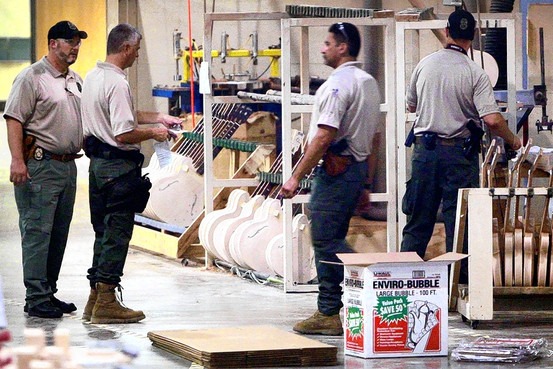 A story is unfolding that has environmentalists, civil liberties advocates, and music lovers all taking notice. Last week, federal agents executed search warrants on Gibson guitar factories in Nashville and Memphis where they seized guitars, electronic files, and multiple pallets of wood. Why? They are accused of importing endangered wood to make guitars out of, an offense that - due to a recent amendment to hundred-year-old law, is basically equivalent to serving a snow leopard for dinner.
A story is unfolding that has environmentalists, civil liberties advocates, and music lovers all taking notice. Last week, federal agents executed search warrants on Gibson guitar factories in Nashville and Memphis where they seized guitars, electronic files, and multiple pallets of wood. Why? They are accused of importing endangered wood to make guitars out of, an offense that - due to a recent amendment to hundred-year-old law, is basically equivalent to serving a snow leopard for dinner.
Gibson, however, has a different take on things, and claims they are a victim of indiscriminate acts by the government and have been denied due process. According to a press release issued by Gibson, the Department of Justice claims that the wood, which comes from India, is illegal only because it wasn't "finished by Indian workers." Basically, if the guitars had been made of the same wood but manufactured by Indian workers in India instead of by American workers on U.S. soil, there would be no problem.
Gibson's CEO Henery Juszkiewicz says the company has done nothing wrong:
"We're in this really incredible situation. We have been implicated in wrongdoing and we haven't been charged with anything," he says. "Our business has been injured to millions of dollars. And we don't even have a court we can go to and say, 'Look, here's our position.'"
The Gibson press release notes that this is the second time the DOJ's Fish and Wildlife Service has raided their factories.
In 2009, more than a dozen agents with automatic weapons invaded the Gibson factory in Nashville.The Government seized guitars and a substantial amount of ebony fingerboard blanks from Madagascar. To date, 1 year and 9 months later, criminal charges have NOT been filed, yet the Government still holds Gibson’s property. Gibson has obtained sworn statements and documents from the Madagascar government and these materials, which have been filed in federal court, show that the wood seized in 2009 was legally exported under Madagascar law and that no law has been violated.
The Justice Department isn't making any comments yet, but the Washington based Environmental Investigation Agency has concluded through independent investigations that in 2009, Gibson did indeed violate the Lacey Act, a law dating back to 1900 that in 2008 was amended to make it "unlawful to import, export, transport, sell, receive, acquire, or purchase in interstate or foreign commerce any plant, with some limited exceptions, taken or traded in violation of the laws of the United States, a State, or an Indian Tribe, or any foreign law that protects plants."
Andrea Johnson, director of forest programs for the Environmental Investigation Agency in Washington, says the Lacey Act requires end users of endangered wood to certify the legality of their supply chain all the way to the trees. EIA's independent investigations have concluded that Gibson knowingly imported tainted wood.
"Gibson clearly understood the risks involved," says Johnson. "Was on the ground in Madagascar getting a tour to understand whether they could possibly source illegally from that country. And made a decision in the end that they were going to source despite knowing that there was a ban on exports of ebony and rosewood."
The company denies the allegations made by the EIA and asserts that they stopped importing wood from Madagascar in 2009.
